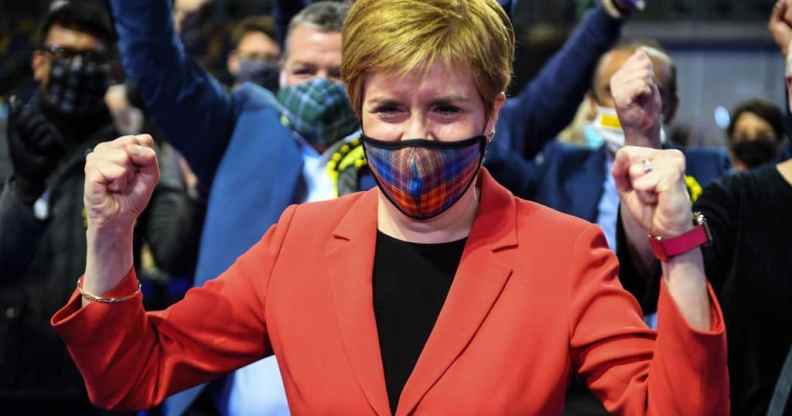4 simple and compassionate ways Scotland can be an international leader on LGBT+ equality once again

Scotland’s First Minister and leader of the Scottish National Party (SNP), Nicola Sturgeon reacts after being declared the winner of the Glasgow Southside seat at Glasgow counting centre in the Emirates Arena in Glasgow on May 7, 2021. (ANDY BUCHANAN/AFP via Getty Images)
It’s been a torrid election campaign for LGBT+ people in Scotland – a discourse tainted by homophobia, transphobia and a low point of slurs towards charities which support these communities.
These Scottish Parliament elections took place just six years after Scotland topped the rankings as the most progressive country in Europe on LGBT+ equality, according to ILGA Europe. Now it has fallen down the rankings and doesn’t even make the top five.
But there are reasons to be hopeful, with more than 60 MSPs elected who have backed calls for concrete steps on LGBT+ equality, including all six of the party leaders and co-leaders now in Parliament.
The Scottish Parliament has rightly been praised as a beacon on LGBT+ progress. Within just a year of being re-established in 1999, the new Parliament faced down a referendum by millionaire Brian Souter who wanted to keep the pernicious Section 2A (otherwise known as Section 28) and it was eventually scrapped three years ahead of England and Wales.
In recent times, Scotland also introduced the world’s first LGBT+ inclusive education curriculum, with LGBT+ issues embedded in lessons. There was even period when three of the five party leaders in the Parliament were gay or bisexual, with former Labour leader Kezia Dugdale describing it as the ‘”world’s gayest parliament”.
Those days of Scotland being an international leader in LGBT+ rights and protections now feel a faint and distant memory. Much like the rest of the UK, progress is sliding backwards with homophobic hate crime trebling from 2014-15 and the UK government rejecting plans to simplify the Gender Recognition Act in England and Wales. Events during the 2021 election have furthered this despair in Scotland. Stonewall Scotland and LGBT Youth Scotland were subject to “baseless claims” about advocating to reduce the age of consent by the Alba Party, with the Greens co-convenor, Patrick Harvie describing a “torrent of transphobic and homophobic abuse” during the campaign by supporters of Alba.
On Thursday voters in Scotland resoundingly rejected Alba, with the party only picking up around two per cent of the national vote and achieving zero seats. Turnout also reached a historic high. The Scottish Parliament now has a mandate to drive forward with making real change to improve the lives of LGBT+ people. The SNP is all but guaranteed to form the next Scottish Government but will require the support of other parties, most likely the Greens, to pass laws.
Here’s what the Scottish Parliament can do.
Ending conversion therapy
All the parties represented have committed to ending this within their manifestos. Despite the issue being debated in the UK Parliament and also a motion passed by the Northern Ireland Assembly, the Scottish Parliament has still not made any material steps towards a ban.
The SNP has stated in its manifesto that banning the abhorrent practice will require the UK government to act first (due to where power lies in making new laws) – UK ministers have already dragged their heels on this for more than 1,000 days. This isn’t good enough and the Scottish Parliament should immediately apply pressure to Liz Truss by passing a motion condemning the practice and drawing up it can do within existing areas of responsibility, including health and criminal justice which are devolved.
Reforming the Gender Recognition Act
A bill proposed by the Scottish Government which promised to improve the process for trans people was put on hold due to the COVID pandemic. The SNP, Greens and Labour all committed to reforming the GRA, with Labour and the Greens including promises to include provisions for non-binary people within a new bill. The SNP promised it would “work with groups” including trans and women’s groups to identify the best way forward – this cannot come with further delay through another consultation when we already know people in Scotland back changes to the GRA.
Improving trans healthcare
Waiting times for gender identity clinics in Scotland remain unacceptably long, with the only GIC for young people having a waiting list of over three years according to Scottish Trans. Adult services in Edinburgh, Aberdeen and Inverness are still 18 months. Labour backed an 18-week target for first referral to bring GICs into line with other parts of the NHS, while the Greens backed measures to improve healthcare access for all LGBT+ people.
Ending new cases of HIV
Scotland has committed to reaching this target by 2030, similar to England and Wales. But this must be backed with money and proper infrastructure. At the moment there is no national service that allows for people to test for HIV at home on the NHS and nearly eight per cent of people living with HIV are undiagnosed. The SNP, Labour and the Greens back plans to end new cases of HIV and increase access to the HIV prevention drug PrEP. Despite women making up a quarter of new HIV diagnoses in the UK, only one per cent of those accessing the PrEP in Scotland are women.
By rejecting candidates and parties that sought to splinter the LGBT+ community and stoke up hate, voters in Scotland have bolstered the demands to turn the dial and improve the lives of LGBT+ people. MSPs must listen to this and act.
Getting back to the top spot of the international rankings shouldn’t just be an aspiration for Scotland, it should be the benchmark to judge the record of this next Scottish Parliament. It can be done and MSPs cannot throw away this opportunity to move forward and make Scotland a leader on LGBT+ equality once again.

